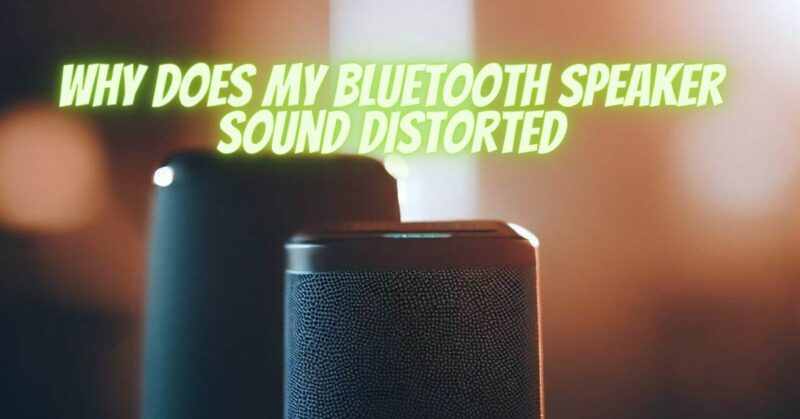Experiencing distorted sound from your Bluetooth speaker can be disappointing and hinder your enjoyment of music or other audio content. Distortion can manifest as fuzzy, garbled, or muffled sound, detracting from the intended clarity and quality. In this article, we will explore common causes of distorted sound in Bluetooth speakers and provide potential solutions to help you overcome this issue.
- Signal Interference: Signal interference is a frequent culprit behind distorted sound in Bluetooth speakers. Other wireless devices, such as Wi-Fi routers, cordless phones, or nearby Bluetooth devices, can disrupt the Bluetooth signal and result in distorted audio. To mitigate this, try moving your Bluetooth speaker away from potential sources of interference or disabling other nearby wireless devices temporarily.
- Low Battery or Weak Signal Strength: Insufficient battery power in either the Bluetooth speaker or the connected audio device can lead to distorted sound. Ensure that both devices have ample battery charge or are adequately powered. Additionally, weak Bluetooth signal strength caused by distance or obstacles can cause audio distortion. Position the speaker and the audio source closer together or optimize their placement to improve signal strength.
- Audio Compression and Codec Limitations: Some Bluetooth audio codecs, particularly those with high compression, can introduce distortion artifacts during the audio transmission. Check the audio settings on your device and experiment with different Bluetooth codecs, if available, to find one that offers better sound quality. Codecs like aptX, AAC, or LDAC often provide superior audio reproduction compared to the standard SBC codec.
- Bluetooth Version Incompatibility: Incompatibility between the Bluetooth versions of the speaker and the audio source can lead to distorted sound. Ensure that both devices support the same Bluetooth version or are compatible with each other’s Bluetooth profiles. Upgrading either the speaker or the audio source to a more recent Bluetooth version can help address compatibility issues and reduce distortion.
- Outdated Firmware or Software: Outdated firmware or software on the Bluetooth speaker or the audio source can contribute to distorted sound. Check for firmware updates for your Bluetooth speaker and ensure that it is up to date. Similarly, update the software on the audio source to the latest version to ensure compatibility and improved performance.
- Speaker Damage or Hardware Issues: In some cases, distorted sound may be caused by speaker damage or underlying hardware issues. Physical damage to the speaker driver or internal components can affect sound reproduction and result in distortion. Inspect the speaker for any visible signs of damage and consider contacting the manufacturer or an authorized service center for further diagnosis and repair.
Conclusion:
Distorted sound in Bluetooth speakers can be frustrating, but with the right troubleshooting steps, it can often be resolved. Address signal interference, ensure sufficient battery power and signal strength, experiment with different audio codecs, check for Bluetooth version compatibility, update firmware and software, and inspect the speaker for any damage. By implementing these solutions, you can improve the audio quality of your Bluetooth speaker and enjoy distortion-free sound. If the issue persists, contacting the manufacturer or seeking professional assistance may be necessary to diagnose and rectify any hardware-related problems.


